Our research projects
Find out more about the research projects you're currently helping us to fund around the country.
120 results found.
Understanding how Adult T-cell lymphoma develops - Dr Goedele Maertens
In this project, Dr Maertens wants to understand how a virus can cause a rare type of lymphoma.
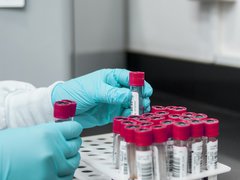
Understanding how MPN develops - Professor Ian Hitchcock
In this project, Professor Hitchcock wants to understand more about how MPN develops.
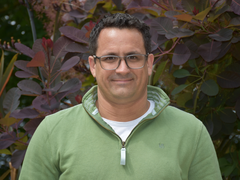
Finding new ways to identify and treat the most aggressive type of DLBCL- Dr Dinis Calado
In this project, Dr Calado will try and understand more about why some types of DLBCL stop responding to treatment.

Understanding what causes relapse in people with AML - Professor Dominique Bonnet
In this project, Professor Bonet wants to understand more about the cell that she thinks is responsible for AML returning.

Understanding how some cancer cells are shielded from chemotherapy - Dr Ingo Ringhausen
In the project, Dr Ringhausen wants to understand more about how CLL cells can resist treatment.

Finding new ways to treat lymphoma - Dr Daniel Hodson
In this project, Dr Hodson is looking for new ways to treat non-Hodgkin lymphoma.

Understanding how fat cells are involved in myeloma returning - Professor Claire Edwards
In this project, Professor Claire Edwards will look at how fat cells are involved in myeloma progressing.

Understanding how CLL progresses - Dr Robbert Hoogeboom
In this project, Dr Hoogeboom wants to know more about how CLL cells move around the body and start growing.
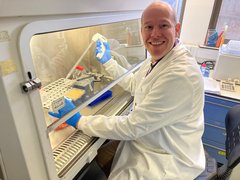
Understanding the role of mutations in the blood as we get older - Dr Kirschner
Read more about Dr Kirschner's research which aims to identify mutations that occur in our blood cells so people at risk of developing blood cancer can be monitored.
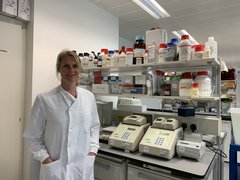
Using ‘fingerprints’ to understand the best ways to treat chronic lymphocytic leukaemia and diffuse large B-cell lymphoma
Chronic lymphocytic leukaemia (CLL) and diffuse large B-cell lymphoma (DLBCL) are blood cancers that have differences within and between each person. Professor Pepper wants to understand the specific features that cause these blood cancer cells to grow out of control and to understand why some cells aren’t destroyed by current treatments.
Finding new and better ways to treat leukaemia in babies - Dr Thomas Milne
In this project Dr Thomas Milne is researching to understand more about how to treat leukaemia in babies so more effective treatments can be developed.

Making CAR-T cell therapy more effective for people with T-ALL - Dr Maciocia
In this project, Paul Maciocia is working to make CAR-T cell therapy a more effective treatment for people with this disease.
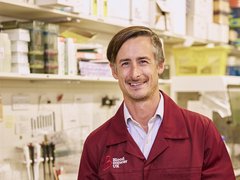
A new treatment for myeloma - Dr Alanna Green
In this project, Dr Alanna Green is testing a new drug called karonudib to treat myeloma.
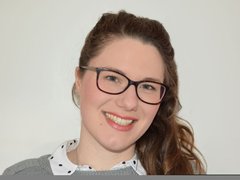
Using CAR-T cell techniques to treat myelofibrosis - Dr Martin Pule
Read more on how Dr Pule is using CAR-T cell techniques provide an alternative and potentially less harmful treatment for young people affected by myelofibrosis.
Understanding the molecules that help myeloma cells to grow and survive - Dr Karadimitris
In this project, Dr Karadimitris wants to understand more about how myeloma cells grow and survive so he can design and develop a new treatment for people with myeloma.
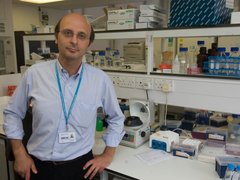
Finding new ways to treat chronic myeloid leukaemia (CML) - Dr Jasmeen Oberoi
Dr Oberoi wants to understand more about a specific protein to see if she can find ways to switch it off to stop the growth of CML cancer cells.
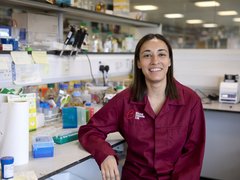
Finding new ways to treat acute myeloid leukaemia - Dr Neil Rodrigues
In this project, Dr Rodrigues is trying to find new ways to treat AML.
Using data to understand more about blood cancer - Professor Andrew Pettitt
In this project Professor Pettitt will look at data on 700,000 people affected by blood cancer to understand more about the disease.

Understanding more about the alterations in our cells that can cause myelodysplastic syndromes (MDS) and acute myeloid leukaemia (AML)
Myelodysplastic syndromes (MDS) and acute myeloid leukaemia (AML) are both types of blood cancer that can occur when the process which repairs damaged blood cells goes wrong. Dr Quek wants to understand more about this to develop better treatments for people with these diseases.
Using AI techniques to improve the diagnosis of MPN -Dr Royston
In this project, Dr Royston is researching the use of computerised techniques to help to diagnose myeloproliferative neoplasms (MPN).

